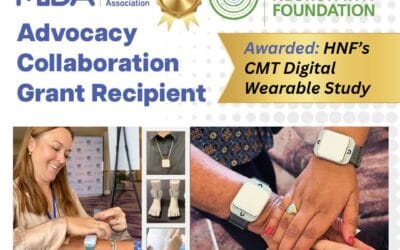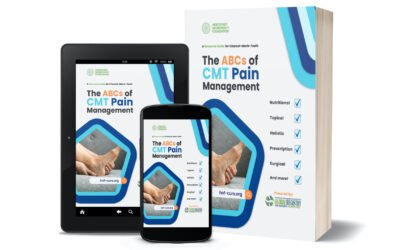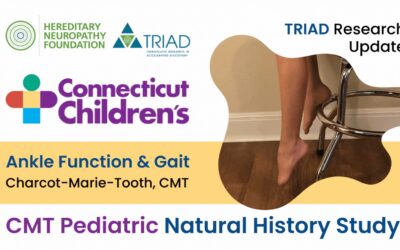HNF acknowledges that single-gene mitochondrial disorders are often go undiagnosed. Recognizing the symptoms, getting the diagnosis and early intervention is key to limit the progression of the disease.
It’s important to document the impact of Mito on the quality of life in childhood. Learning about the symptoms and joining HNF’s patient registry will help us prepare for pediatric clinical trials!
Participate by confidentially sharing your child’s health data. Join HNF’s Global Registry for Inherited Neuropathies (GRIN) & complete the Natural History study, followed by the Pediatric Quality of Life survey.
Note: For your child to participate in this study, please complete the natural history study and health and development survey. Once those two studies are completed, you can bypass the other listed studies and select pCMT QoL.
CMT GRIN Stats
Did you Know?
%
Of CMT Patients Reported the Absence of Reflexes
(Photo: Lindsey Flynt, Mito mom and Dr. Battersby)
The Battersby Lab, located at the Institute of Biotechnology at the University of Helsinki, funding from HNF to support their research into mitochondrial diseases and MTRFR/C12orf65 deficiency, also known as CMT6 with Leigh Syndrome.
“This donation provides us with critical experimental resourcing to perform some challenging experiments this year, which we need to show to secure large-scale funding for the therapeutic approach that I am developing in collaboration with Prof Robert Burgess (Jackson Laboratory, Bar Harbor, ME, USA).”
– Dr. Brendan Battersby, PhD., University of Helsinki
HNF Mito Fight
HNF is focused on the certain mitochondrial diseases
Meet Children’s Author C.M. Harris
C.M. Harris is an award-winning children’s author, disability advocate, and founder of Purple Diamond Press. She is the author of What If We Were All The Same!, a beloved picture book that celebrates differences and helps kids understand the importance of kindness and...
MDA Awards Grant to HNF for Groundbreaking Digital Wearable Study on CMT!
Exciting news for the Charcot-Marie-Tooth (CMT) community! The Hereditary Neuropathy Foundation (HNF) has been awarded an Advocacy Collaboration Grant from the Muscular Dystrophy Association (MDA) to further its groundbreaking work in CMT research. This funding will...
7 Reasons You Can’t Miss the Nashville CMT Summit
Mark your calendars for April 24–26, 2025, because the Nashville CMT Summit is bringing the ultimate blend of knowledge, community, and fun! Here are 7 reasons you absolutely need to be there: Test & Try Mobility Aids: Explore the latest tools to keep you moving...
Jaxson’s Clayshoot for Mito CMTs
Jaxson’s Clayshoot for Mito CMTs Among the various forms of CMT, mitochondrial CMT (Mito-CMT) represents a particularly challenging subset, where genetic mutations impact the mitochondria—often referred to as the powerhouse of the cell. For those living with Mito-CMT,...
Reducing Genetic Testing Barriers for the Charcot-Marie-Tooth Community
Hereditary Neuropathy Foundation Partners with InformedDNA® on CMT Genie Project
HNF Launches Groundbreaking ‘ABCs of CMT Pain Management’ Guide
"ABCs of CMT Pain Management" is now on Amazon! The Hereditary Neuropathy Foundation is thrilled to introduce the "ABCs of CMT Pain Management," a comprehensive guide. This guide embodies the power of collective stories through patient-reported data and an unwavering...
Pediatric CMT Natural History Study Enrollment Opening at Two Centers of Excellence
Pediatric CMT Natural History Study enhancement to their Charcot-Marie-Tooth (CMT) and Inherited Neuropathies (IN) patient registry, Global Registry for Inherited Neuropathies (GRIN).
CMT Research Update: Pediatric Ankle And Gait Function
HNF TRIAD Academic Partner Connecticut Children’s Publishes Results of CMT Pediatric Natural History Study to Better Understand Ankle Function and Gait HNF-funded research sought to determine how age and CMT type affect ankle strength in children. A detailed...
Hypotonia & CMT
Hypotonia, or low muscle tone, can be caused by a variety of factors, including genetic conditions like Charcot-Marie-Tooth (CMT) disease
Pediatric Care & Pain
What are the key CMT milestones, markers, and interventional therapies to consider when raising a child with CMT?











